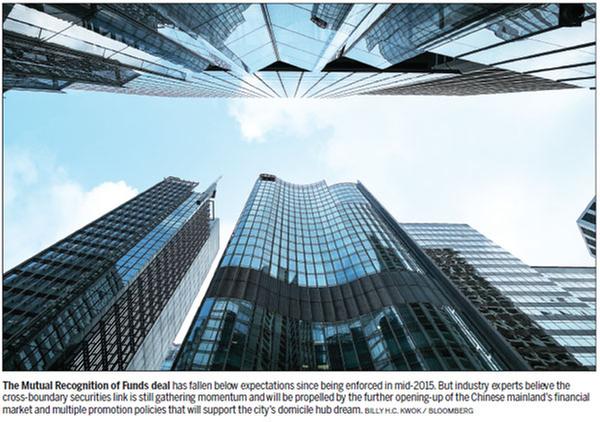Funds pact a boost for SAR's domicile hub goal

More strategies expected to promote HK's capital-raising activities
The Mutual Recognition of Funds (MRF) agreement between Hong Kong and the Chinese mainland - the nation's first such deal with an overseas market - marked a milestone in the SAR's aspirations to become a global investment fund domicile center.
Since the pact's launch in mid-2015 in the midst of the mainland's liberalization of its capital market, Hong Kong's Securities and Futures Commission (SFC) and the China Securities Regulatory Commission (CSRC) had granted 48 southbound funds (mainland funds selling in Hong Kong) and six northbound funds (Hong Kong funds selling on the mainland) as of January this year.

The agreement enables eligible Hong Kong and mainland-domiciled funds to be sold in each other's retail fund market. It's estimated that about 100 Hong Kong-domiciled funds and 850 mainland-domiciled funds now qualify for MRF status.
According to the SFC, the number of Hong Kong funds has more than tripled since 2010 - from 200 to almost 700 at the end of June last year - giving the SAR the impetus to transform itself from a fund distribution/marketing center to a fund domicile/management hub.
However, initial expectations of substantial cross-boundary fund flows have yet to materialize. As of October last year, the program had seen just $1.2 billion in northbound net fund flows and $13.9 million in southbound net fund flows - a far cry from the combined northbound and southbound quota of $87.9 billion.
The poor show has been attributed to several factors. One of the impediments is delayed authorization as the CSRC has been exercising extreme caution in approving northbound funds in the past two years due to market volatility and fears they may fuel the flight of capital by mainland investors hedging against a depreciating renminbi.
Investor confidence in the MRF has also been lukewarm, with mainland investors buying time to get themselves familiar and comfortable with Hong Kong-domiciled funds, while Hong Kong-based investors are reluctant to sink their capital directly into mainland funds.
Besides the MRF, the central government has taken various key steps to liberalize the country's capital market in the last couple of years, including launching the Shanghai-Hong Kong Stock Connect in November 2014 and the Shenzhen-Hong Kong Stock Connect in December 2016. A Bond Connect is also due to start later in the year.
Despite the MRF falling short of expectations, industry pundits reckon it's only a matter of time before Hong Kong and mainland fund managers get acquainted with brand-building and establish effective fund distribution practices in both markets to make the program successful.

"With the Chinese mainland liberalizing its capital markets, the support of Hong Kong's policymakers, and the creation of a cross-boundary fund passport between the mainland and Hong Kong, many in the industry predict that Hong Kong is poised to become the next global fund domicile," fund management administrator Brown Brothers Harriman (BBH) said in a survey report in December last year.
BBH polled 52 global asset managers in October last year to gauge their views. Around 80 percent of the respondents believed there's a medium-to-high probability of Hong Kong becoming a leading Asian cross-boundary fund domicile center by 2025. Another 50 percent expected Hong Kong's fund market to double and approach the $1-trillion mark.
Hong Kong inked a similar agreement with Switzerland last year, fortifying the city's role as a cross-boundary fund management nucleus in the years ahead.
Late last year, the SFC and the Swiss Financial Market Supervisory Authority signed a Memorandum of Understanding on Hong Kong-Switzerland Mutual Recognition of Funds and Asset Managers. Under the deal, eligible Swiss and Hong Kong investment mutual funds can be distributed in each other's market through a streamlined vetting process. Hong Kong-based asset managers can now use the agreement to promote Hong Kong-domiciled funds to Swiss-based investors.
The Hong Kong-Switzerland MRF accord - the city's first formal link with a jurisdiction other than the Chinese mainland regarding fund distribution - is less restrictive than its mainland equivalent insofar as a wider range of fund structures and strategies are allowed, namely funds using derivatives, money market funds, feeder funds and fund of funds.
Industry experts said the wider range of fund types and strategies allowed under the Switzerland deal will bring significant capital-raising benefits for Hong Kong as local fund managers can raise money from the huge Swiss private banking market and high-net-worth investors.
oswald@chinadailyhk.com

(HK Edition 06/23/2017 page1)
Today's Top News
- US-Israel attacks on Iran open Pandora's box
- Israel, US attacks on Iran fuel tensions in region
- Comment: Israel-Iran conflict unlikely to be contained
- Israeli announces 'preemptive' strike on Iran
- New guideline stresses 'health first' in schools
- Leadership meeting discusses draft for 15th Plan






























